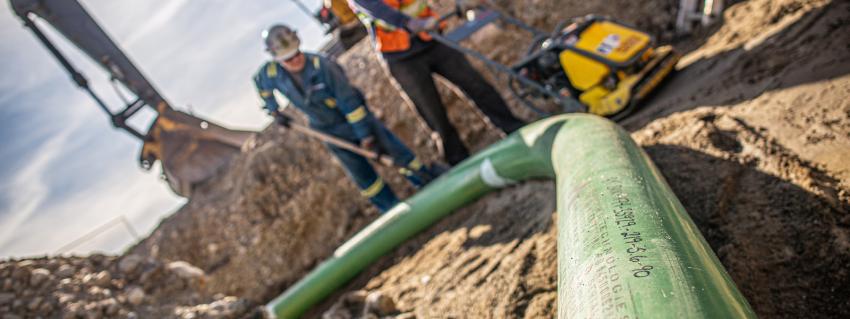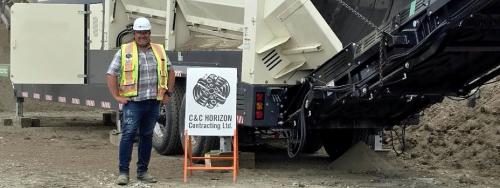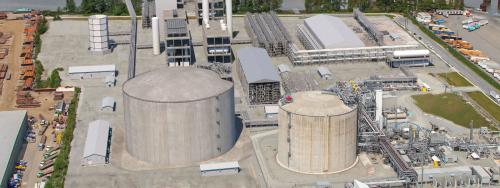Strengthening infrastructure through collaboration
The CTSU Project is focused on upgrading FortisBC’s gas system in multiple locations across the Lower Mainland. This important work makes our infrastructure safer and more reliable, so we can keep supplying energy to 1.3 million homes and businesses in British Columbia. Working with Indigenous-owned and affiliated businesses has been key to our success, thanks to their expertise and dedication.
The CTSU Project has partnered with 28 Indigenous-owned and affiliated businesses from more than a dozen Indigenous communities to provide a range of services, including safety services, concrete services, welding, vegetation management, electrical services, and traffic and site control.
By ensuring fair access to employment and business opportunities for Indigenous communities, we are upholding our Statement of Indigenous Principles, and our commitment to economic reconciliation. The CTSU Project, has to date, seen an impressive fifteen per cent of our supply chain spend directed toward Indigenous businesses. Among these selected vendors, two standout contributors were Se’mant Contractors Inc. and First Nation Owned (FNO) Contractors.
Se’mant Contractors Inc.: bringing expertise and cultural knowledge
Se’mant Contractors Inc., an Indigenous-owned civil construction contractor with over 100 years of combined experience in heavy civil construction, played a vital role in the CTSU Project. Se’mant started as a dry-vac contractor but soon took on vegetation management and site rehabilitation. Se’mant quickly showed their skills and reliability, expanding their work to several CTSU Project sites.
Dirk De Boer, CEO of Se’mant Contractors Inc., said the strong relationship with FortisBC’s project team was a key part of their success on the CTSU Project. “We worked really well together, resulting in a good relationship between us and FortisBC.”
De Boer also emphasized the shared standards between FortisBC and Se’mant, especially regarding environmental safety and standards. “The alignment of values was key. FortisBC demonstrates that environmental safety and standards are high on their priority list, and as an Aboriginal company, it is really appreciated. It’s nice for us to be involved in a project that not only ‘talks the talk’ but ‘walks the walk’ as well.”
First Nation Owned (FNO) Contractors: a new relationship with lasting impact
The CTSU Project was FNO Contractors’ first engagement with FortisBC. As a concrete and associated products Indigenous-owned company, FNO prides itself on relationship-building and problem-solving. The detailed and thorough onboarding process showed FortisBC's commitment to safety, which helped FNO succeed.
Paul Lalli, Project Manager at FNO, shared, “It was such a great opportunity to work with FortisBC on this project. The people we worked with were just fantastic and really wanted to give FNO the opportunity to succeed.”
The broader impact: economic reconciliation and industry change
Both Se’mant and FNO emphasized the importance of opportunities with companies like FortisBC for Indigenous- owned and affiliated businesses. These collaborations help small businesses grow and create jobs, training, and contracting opportunities for Indigenous Peoples.
Paul Lalli, who has worked with First Nations companies for over 15 years, noticed a change in the industry. “I think there is a shift in industry—companies want to include Indigenous contractors, but the hesitation comes from the fear of the unknown. Opportunities with FortisBC help Indigenous businesses build credibility, enabling them to approach other organizations and bid on future work with confidence.”
Cultural awareness and continuous learning
We are committed to fostering cultural safety and awareness among our employees and contractors. As part of the CTSU Project, all employees attended Indigenous Awareness Training. Kʷikʷəƛ̓əm (Kwikwetlem) First Nation also provided extra cultural and archaeological safety training before work started in their traditional territory.
This training helps us provide psychological and cultural safety to our workforce. With ten per cent of employees in the field self-reporting as Indigenous, the CTSU Project highlights the value of these efforts.
As we look to the future, we remain dedicated to ensuring that Indigenous businesses and communities continue to thrive through fair and equal access to opportunities. Our journey does not end here— we will keep listening, learning, and building partnerships that benefit all.



